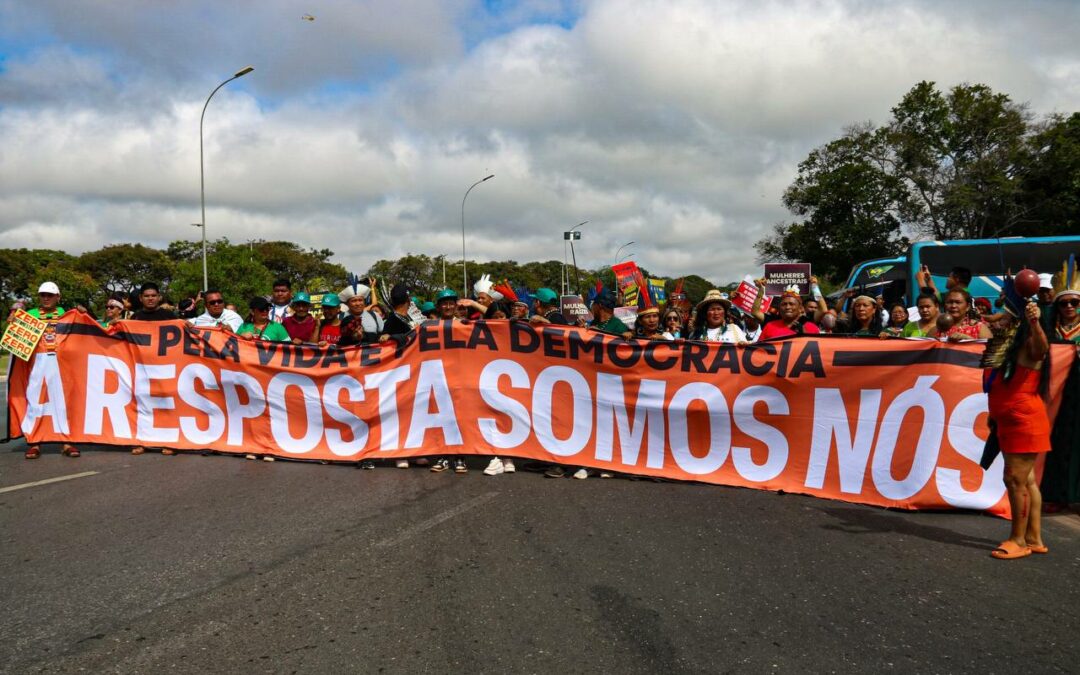Photo: _ @sallynhandewa
With the launch of an Indigenous NDC and the creation of an international commission, APIB strengthens the participation of Indigenous Peoples on the road to COP-30 in Belém.
The Articulation of Indigenous Peoples of Brazil (APIB) will launch today (April 10), at the Free Land Camp (ATL), an Indigenous Nationally Determined Contribution (NDC). In addition, the Ministry of Indigenous Peoples will announce an Indigenous International Commission for the United Nations Climate Change Conference (COP-30), which will take place in November in the city of Belém (Pará).
The NDC and the commission will be announced at the plenary “We Are the Answer: Indigenous Peoples on the Road to COP-30,” at the ATL, starting at 2 p.m., with the presence of Ambassador André Corrêa do Lago, president of COP-30. Ministers Sonia Guajajara, from the Ministry of Indigenous Peoples (MPI), and Marina Silva, from the Ministry of Environment and Climate Change (MMA), along with Federal Deputy Célia Xakriabá, who will also join the panel. These actions are part of the global campaign “We Are the Answer,” led by the Indigenous movement, which asserts that Indigenous Peoples and the demarcation of Indigenous Territories are essential in the fight against the climate crisis.
Developed from the accumulation of proposals by APIB’s regional organizations, the Indigenous NDC reinforces that the climate debate must consider equity, self-determination, and the effective participation of Indigenous Peoples and traditional communities in the implementation of Brazil’s NDC under the Paris Agreement.
The document is divided into six thematic axes:
- Mitigation, which defends the recognition and protection of territorial rights as essential climate mitigation policy;
- Adaptation, which highlights the importance of protecting ancestral knowledge, such as fire management and indigenous medicine;
- Financing, which proposes revising existing mechanisms and creating specific tools for the direct funding of indigenous organizations;
- Technology transfer, which suggests integrating traditional knowledge with modern science in climate strategies;
- Capacity-building, focused on technical training and access to climate information in accessible language;
- Justice and ambition, which recognizes the historical debt owed to indigenous and traditional peoples;
- Co-benefits, which links land demarcation to climate action, strengthening Brazil’s international commitments.
“The document is based on climate justice, the right to free, prior and informed consent, and the importance of solutions that respect nature and are conceived and led by Indigenous Peoples,” says Dinamam Tuxá, executive coordinator of APIB.
Commission for the Conference of the Parties
With the mission of amplifying the visibility and influence of Indigenous Peoples in climate negotiations, the Indigenous International Commission for COP-30 will be chaired by Minister Sonia Guajajara and will include the following organizations: APIB, COIAB, ANMIGA, the G9 of the Amazon, the Global Alliance of Territorial Communities (GATC), and the United Nations Permanent Forum on Indigenous Issues (UNPFII). There is also dialogue to include other international Indigenous organizations and forums.
“The commission is a platform that seeks to advance Indigenous rights, resilience, and climate leadership. At COP-30, we have the opportunity to ensure the best and largest indigenous participation in history. Our goal is to have one thousand accredited Indigenous representatives in the Blue Zone,” says Minister Guajajara.
The commission’s responsibilities include developing a methodology to guarantee Indigenous Peoples’ accreditation for the Conference of the Parties as an institutionalized practice for future COPs; ensuring focus on the specific priorities of Indigenous Peoples; conducting regional meetings; and planning and implementing high-level events and meetings with state parties, UN agencies, and allies to amplify indigenous demands.
International Participation at ATL 2025
The 21st edition of the Free Land Camp is marked by the participation of international indigenous delegations. Indigenous representatives from more than 15 countries are participating, including from the eight Amazon Basin countries, Australia, and Fiji, as well as leaders from the Global Alliance of Territorial Communities (GATC), which represents Indigenous Peoples and local communities from 24 countries.
According to APIB, the organizations participating in the mobilization include: Interethnic Association for the Development of the Peruvian Rainforest (AIDESEP), Amerindian Peoples Association (APA – Guyana), Confederation of Indigenous Nationalities of the Ecuadorian Amazon (CONFENIAE), Confederation of Indigenous Peoples of Bolivia (CIDOB), Federation of Indigenous Organizations of French Guiana (FOAG), Organization of Indigenous Peoples of Suriname (OIS), National Organization of Indigenous Peoples of the Colombian Amazon (OPIAC), Regional Organization of Indigenous Peoples of the Amazon (ORPIA), and the Global Alliance of Territorial Communities.
On April 10, the delegations will participate in the “Meeting with Embassies: We Are the Answer – Indigenous Peoples’ Visions for COP-30,” with the aim of bringing Indigenous demands to the embassies of Germany, Austria, Australia, Canada, Denmark, Spain, France, Finland, Ireland, Norway, the Netherlands, Peru, the United Kingdom, Sweden, Switzerland, and the European Union. Also participating will be the Ministry of Indigenous Peoples, Ministry of Environment and Climate Change, Ministry of Foreign Affairs, and the German Agency for International Cooperation (GIZ).
ATL 2025 brings together over 7,000 Indigenous participants at the National Arts Foundation (Funarte) in Brasília. Under the motto “We Are the Answer,” on April 10 at 4 p.m., Indigenous Peoples will march through the streets of the federal capital to the Plaza of the Three Powers.

